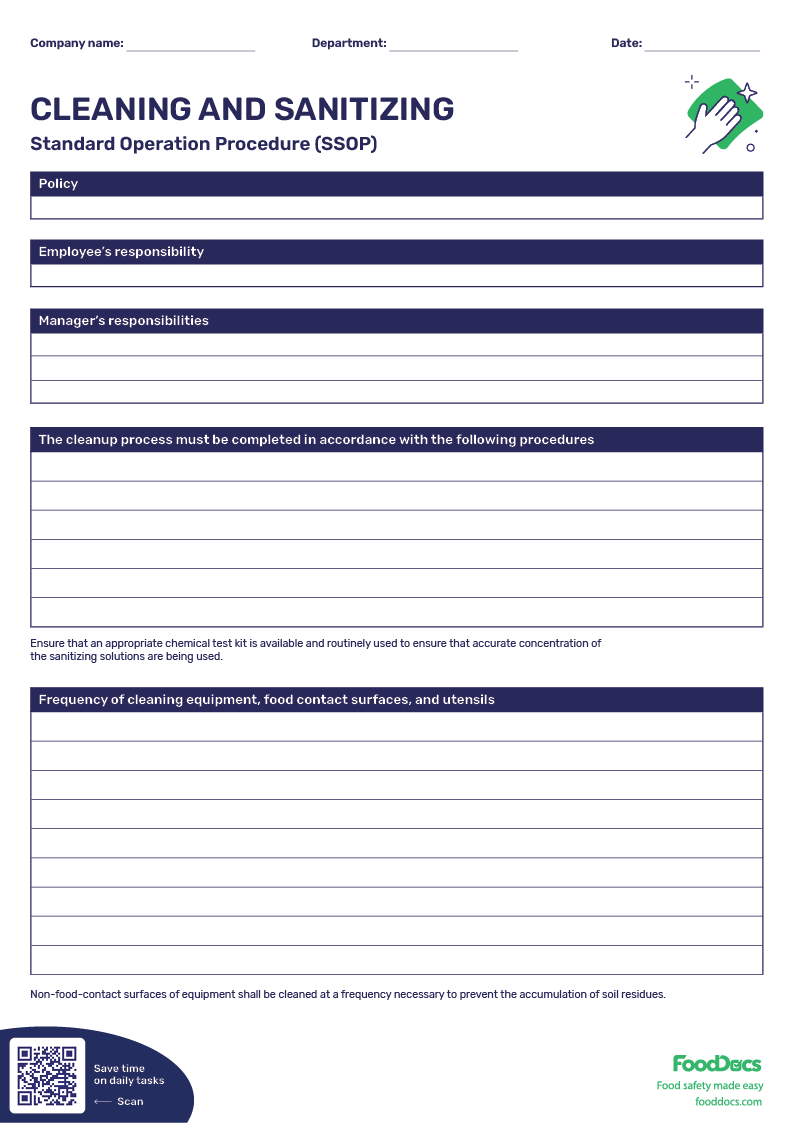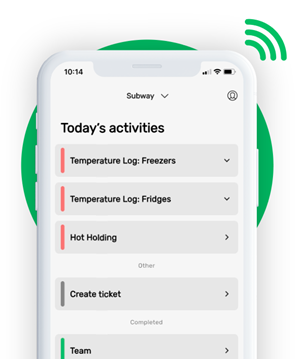Sanitation Standard Operating Procedures (SSOP) Template | Free Download


This is how our Digital Food Safety platform saves 20% of your time on daily tasks:
- Get upcoming task notifications
- Add data into the app
- Check the status of tasks in real-time

When food safety was still handled on paper, I typically spent a couple of hours per day getting the papers and going around checking or completing tasks… Now I can sit down and it's just all there in one place. It takes me 5-10 minutes.
Ruth B.
Store Manager
Sanitation Standard Operating Procedures (SSOPs) are a food safety plan staple that help maintain stringent standards essential for ensuring that food production environments remain clean and safe. These procedures are not just recommendations but are necessary measures for preventing food contamination and ensuring consumer safety.
The role of SSOPs is to provide systematic and practical steps that guarantee all areas of food handling and processing are sanitized and free from potential food safety hazards.
If you want to customize one directly in your browser, check out this customizable SSOP or download this blank general SOP template.
Key takeaways
- SSOPs are essential for maintaining high standards of food safety and cleanliness in any food handling environment.
- These procedures are mandatory for businesses subject to health inspections and those aiming to uphold superior food safety standards.
- SSOPs prevent contamination and ensure a clean, safe environment for food production and service.
- Implementing SSOPs leads to enhanced food safety, improved regulatory compliance, and increased customer trust.
- Operational benefits of SSOPs include more efficient cleaning processes and better resource utilization, leading to cost savings.
- Developing SSOPs involves identifying critical areas, creating specific cleaning protocols, and training staff on these procedures.
- Customizing SSOPs to fit specific business needs and local regulations is crucial for their effectiveness.
- Regular monitoring and updating of SSOPs ensure they remain relevant and effective in maintaining food safety standards.
- FoodDocs software can automate the creation, implementation, and monitoring of SSOPs, making management easier and more efficient.
WHAT WE'LL COVER:
Understanding Sanitation Standard Operating Procedures
SSOPs are detailed, written documents designed to guide the food service industry in the proper cleaning and sanitizing of facilities and equipment. They serve a critical role in the food safety ecosystem, delineating standardized methods that help prevent the risk of contamination.
Meticulously outlining your SSOPs procedures for cleaning and sanitation earlier than later will ensure that your food safety is maintained throughout the production process, safeguarding both public health and business reputation.
Who needs SSOPs?
SSOPs are required across a broad spectrum of establishments where food is processed, handled, or served, including food processing plants, restaurants, and cafeterias.
These standard operating procedures are crucial for businesses that undergo regular health inspections and for those committed to upholding superior food safety standards.
For these businesses, SSOPs are not just guidelines but are foundational practices that help them meet regulatory requirements and maintain high standards of food hygiene and safety.
What are the benefits of implementing SSOPs?
Implementing SSOPs provides numerous advantages for businesses in the food industry:
- Enhanced food safety: Ensures the highest standards of cleanliness and hygiene, reducing the risk of foodborne illnesses.
- Improved compliance: Meets regulatory requirements, helping businesses avoid legal issues and potential fines.
- Increased customer trust: Builds confidence among consumers about the safety and quality of the food served.
- Operational efficiency: Optimizes cleaning processes, saving time and resources. It also reduces waste, leading to cost savings and environmental benefits.
5 Tips for implementing SSOPs in your business
To effectively implement SSOPs in your business, follow these steps:
- Identify critical areas: Determine where regular sanitation is essential to prevent contamination.
- Develop cleaning protocols: Create detailed cleaning schedules and outline specific steps for sanitizing equipment and facilities.
- Train staff: Conduct comprehensive food safety training to ensure all employees understand and can implement SSOPs.. Providing ongoing education also helps keep staff updated on any changes or improvements.
- Customize to fit business needs: Tailor SSOPs to address the unique aspects of your operations and ensure they meet local and industry-specific regulations.
- Monitor and update: Regularly review SSOPs to assess their effectiveness. Remember to update procedures as needed to keep up with changes in regulations or business operations.
Focusing on these key steps will help your food business comply with health regulations. It'll also enhance their operational practices, leading to better food safety outcomes and increased customer satisfaction.
How FoodDocs simplifies SSOP management
FoodDocs simplifies the management of SSOPs through its digital food safety management software, which automates the creation, implementation, and ongoing management of sanitation procedures.
If you need a HACCP plan created, our AI-powered HACCP plan builder will create the complete food safety document in less than an hour.

Or use our food safety monitoring software to help your team complete daily tasks more easily, accurately, and efficiently.

Try FoodDocs free for 14 days and see how you can benefit from done-for-you monitoring checklists (which are fully customizable according to your needs) and an intuitive mobile app that makes food safety task completion easy.













